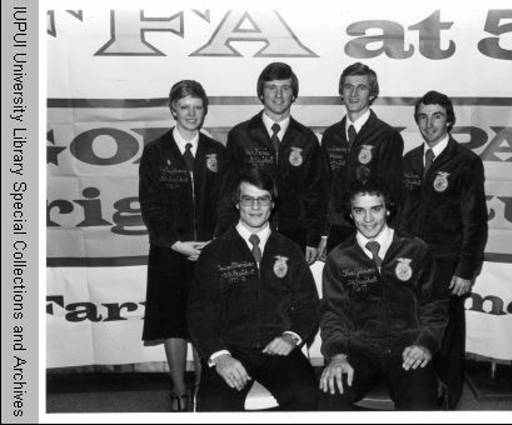Why did you select your major or graduate program?
Our family farm was not large enough to support two families so I decided that teaching vocational agriculture at the high school level would be great way to work in agriculture and stay involved with FFA, which was an important aspect of my life in high school. My high school ag teacher, Keith Nowels, was also a major influence in my career choice.Why did you choose to attend The Ohio State University?
It was the only college of agriculture in the state, and I was familiar with the agricutlural campus as a result of FFA activities hosted there.
What were you involved in as an Ohio State student?
I was active in the Agricultural Education Society and was a charter member of the Student Alumni Council. I also volunteered as a reader for blind students.
What classes did you enjoy the most while at Ohio State?
I signed-up for a “dessert course” each quarter — my name for a course I took just for the enjoyment of it — as a treat for taking all the math and other required subjects. Theses ended-up being my favorites, even though I enjoyed the courses in my major field of study. Among my dessert courses were Argumentation and Debate, Ballroom Dancing, Ohio History, Greek and Roman History, Islamic History, Russian Culture, Ancient Hebrew Literature, History of Art, and The English Bible as Literature. Each of these was a fascinating experience.
What professor, faculty or staff member had an impact on your education/career?
My faculty advisor, Dr. J. Robert Warmbrod had a major influence in my OSU experience. He took a personal interest in my course planning, and advised me in many decisions which I would not have made as well on my own. Also, Dr. L.H. Newcomb was an outstanding undergraduate professor and made his courses lively and interesting. The late Dr. Rodny Plimpton (Animal Science) and Dr. Bernard Erven (Ag Econ) were also stand-out instructors.
What is your favorite memory related to your time at Ohio State?
I made several lasting friendships at OSU, and really enjoyed the size and scale of the place. I came from a rural background, and found the size of OSU very different from what I was used to, and thus exciting. Some ag students found this a negative — a necessary evil in order to get their degree, and they went back home each weekend for high school sporting events, etc. But I liked to stay on campus because there was a lot going on! University 4-H hosted square dances in the Ag Admin parking lot, and they were fun.
What was your first job following your education at Ohio State?
Teacher of vocational agriculture at Crestview Schools, Van Wert County, Ohio.
For what schools, companies and/or organizations have you worked throughout your career and what were your responsibilities in those positions?
Vocational agriculture teacher at Crestview Schools in Van Wert County, then area supervisor of agricultural education for the Ohio Department of Education and State FFA Executive Secretary, then I changed careers, leaving agriculture for financial services/investments.
During your career, honors or awards have you been presented?
I was a member of the state board of education for nine years – one term appointed by Governor Bob Taft, and one term elected by the voters. I received the Honorary State and American FFA Degrees, a distinguished service award from the Agricultural Education Society, and a career award from the College of Agriculture. I also received the Dave Kysilko Award for Outstanding Service to State Boards of Education, from the National Association of State Boards of Education.
As of today, what is your favorite career highlight?
I am proud of some accomplishments while serving as state FFA executive secretary. I am also proud of having built a successful brokerage practice in Holmes County over the past 29 years.
What advice would you give to a current student?
Be more diligent in doing all the reading assignments for each course — don’t rely only on what you learn in lectures for all that you take away from a course. (In saying that, I am neither admitting nor denying anything!) Broaden your course choices — don’t take only courses in your major — acquire an understanding of the larger world than just your career choice. Don’t stop at the minimum number of courses you need for your degree. I had to have 196 quarter credit hours to graduate. I graduated with 238 quarter credit hours. Some would view those extra 42 credits as a waste of time and money. My mind works differently. It was a bargain! I would not want to have missed any of those courses I took beyond the minimum. Don’t let “minimums” set by others become your “maximums.”
What did ACEL cultivate in you? How?
I learned “how to learn,” and how to organize activities. I learned how to write a curriculum and a lesson plan, how to teach the lesson, and how to evaluate student learning. All of these skills have great transferability to other careers and other activities in life, because they are disciplines of thinking in an organized way while maintaining a focus on the end result. Teaching is essentially the art and science of finding out what someone already knows about a given subject, and then moving their knowledge or skill to the next level. The ability to do that has broad application in life — well beyond a classroom.


